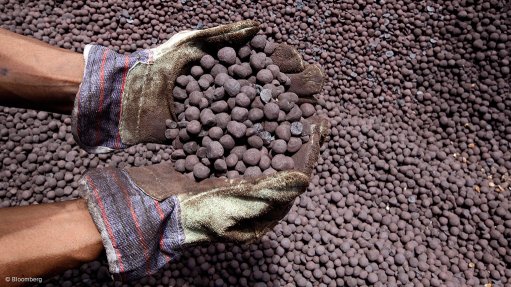Trade relations from afar
It took Julie Gold, in her own words, “on the one hand, two hours to write and, on the other hand, 30 years to write”, in 1986, the most famous of songs. The song was first recorded by Nanci Griffith for her 1987 album, Lone Star State of Mind, but it only became a commercial success after Bette Midler recorded it for her album, Some People’s Lives. Midler’s version went on to be number one on the Adult Contemporary chart and peaked at number two on the Billboard Hot 100. More importantly, however, it went on to win a Grammy for Song of the Year in 1991. Another accolade: the song won a 3 Million Airs Award from Broadcast Music Incorporated.
The title of the song is in its very first verse: “From a distance”. The song starts thus: “From a distance; The world looks blue and green; And the snow-capped mountains white; From a distance; The ocean meets the stream; And the eagle takes to flight; . . . From a distance; You look like my friend; even though …”
These lyrics remind me of a union – an economic union – in which friendships are going to be tested over the next two years (at the very least) starting in March 2017. I am referring, of course, to the 28-member European Union (EU), from which the UK is to withdraw. Following the Brexit outcome of the referendum on whether to remain within the union or leave, the UK is obliged to invoke Article 50 of the Treaty of Lisbon, which was signed by EU member States on December 13, 2007, and came into force on December 1, 2009. This is the first time in the history of the EU, established on March 25, 1957, as the European Economic Community, that a member has decided to withdraw.
The UK’s withdrawal is anything but straightforward, owing to the fact that the UK itself is not united on whether to remain or to exit. Also voting in the UK referendum was Gibraltar, a British overseas territory that voted overwhelmingly in favour of the UK remaining a member of the EU. Scotland also voted in favour of remaining. Subsequent to the Brexit vote, both Gibraltar and Scotland indicated that they intended to explore a special dispensation with the EU. Some might say that they have a snowball’s hope in hell.
It is quite disconcerting that there is a sizeable section of British society that, quite evidently, has difficulty accepting a democratic electoral outcome; this is despite Britain’s stated desire for constitutional democracy, which started in 1066. The British, as a nation, are known for urging other countries to accept the democratic outcome of elections in their own countries if the elections are adjudged to have taken place in a free and fair environment. However, the British seem less intent on doing so themselves. Brexit has come to pass, and there is not much to do for those who did not like the outcome but to accede to the wishes of the majority.
Amidst the uncertainty surrounding the UK’s EU withdrawal, one thing is quite evident – South Africa simply does not matter. In recent weeks, British Prime Minister Theresa May met with her counterparts in India, Scotland and, yes, Gibraltar. She has also met with other world leaders, including EU leaders (on numerous occasions since the Brexit vote), but not with her South African counterpart. So, how committed is the UK to the Economic Partnership Agreement (EPA) between the EU and the Southern African Development Community (SADC), which, essentially, replaced the December 31, 1999, Trade, Development and Cooperation Agreement (TDCA)?
On October 21, the South African Revenue Service (Sars) announced the publication of the General Notes to Schedule 1 of the Customs and Excise Act,1964, and the amendment of Part 1 of Schedule No 1 of the Act (fish products) and of Part 1 of Schedule No 1 of the Act (industrial products). Sars also announced the amendment of Schedule No 10 by renumbering Part 1 as Part 1A and inserting Part 1B into the Act to give effect to the implementation of the EPA between the EU and the SADC EPA States, with retrospective effect to October 10.
On the same day, Trade and Industry Minister Dr Rob Davies announced the publication, in terms of the Merchandise Marks Act, of the final prohibition (the first notice was published on February 4, 2014) of the use of the EU agricultural products and beer names, as well as the Rules of Use applicable thereto relating to fruit, vegetables and cereals (whether fresh or processed); cheeses (Part 1); cheeses (Part 2); meat products; olive oil; fisheries products; beer; and other products. This will, of course, disturb South Africa’s trade with the EU.
Also on October 21, Sars informed of the amendment of the General Notes to Schedule No 1 of the Customs and Excise Act, 1964, and of the Ordinary Customs Duty (Part 1 of Schedule No 1 of the Act), as well as the insertion of Part 7 of Schedule No 10 of the Act to give effect to the implementation of the preferential trade agreement between the Common Market of the South (Mercosur) and the five-member Southern African Customs Union (Sacu), with retrospective effect from April 1.
So, which of the EU and Mercosur member States are really South Africa’s friends?
As I mentioned in last week’s column, I had stumbled across an article by Anje Rautenbach, which was published on October 13 and was titled ‘Here are your SA visa-free destinations: Coming soon, Europe?’ As the title suggests, the article lists those countries that afford South Africans visa-free access. This made me wonder. South Africa has free trade agreements (FTAs) with the 28-member EU, the four-member European Free Trade Association (EFTA), the 15-member SADC and the five-member Mercosur grouping. How many of these 52 countries (ignoring the overseas territories and departments of the EU) afford South Africans visa-free access?
The 28 EU member States are Austria, Belgium, Bulgaria, Croatia, Cyprus, the Czech Republic, Denmark, Estonia, Finland, France, Germany, Greece, Hungary, Ireland, Italy, Latvia, Lithuania, Luxembourg, Malta, the Netherlands, Poland, Portugal, Romania, Slovakia, Slovenia, Spain, Sweden and the UK. The EFTA member States are Iceland, Liechtenstein, Norway and Switzerland. The SADC member States are Angola, Botswana, the Democratic Republic of Congo, Lesotho, Madagascar, Malawi, Mauritius, Mozambique, Namibia, Seychelles, South Africa, Swaziland, Tanzania, Zambia and Zimbabwe. The Mercosur member States are Argentina, Brazil, Paraguay, Uruguay and Venezuela.
Visas are required to visit any of the EU and EFTA States, while no visas are required for eight of the SADC member States and all the five Mercosur member States. So, only 25% of the countries with which South Africa has FTAs afford South Africans visa-free travel, and all these countries are in the southern hemisphere. No country in the northern hemisphere affords South Africans visa-free access. Quite interesting that. Not even the US, which provides South African goods with customs-duty-free access, extends visa-free access to South Africans. Quite evidently, products of South African origin are more welcome in these countries than South African citizens.
Well, South Africans might well want to contemplate that, although, “from a distance you look like my friend, on closer inspection, it is apparently not the case. A friend is someone for whom one has a strong liking and trusts. Non-visa-free access, quite evidently, shows a lack of trust in South African travellers. Or could it be that South Africans have a tendency to overstay their welcome?
Straining South Africa’s trade relations with the EU further, on October 21, Sars announced the imposition of six antidumping duties ranging from 5.81% to 30.77% on frozen potato chips originating in or imported from Belgium and the Netherlands, effective on the day. This adds to the seven antidumping duties ranging from 3.86% to 73.33% that were recently imposed against Germany, the Netherlands and the UK.
Just in case you thought that the People’s Republic of China (the target of antidumping duties in this country) is South Africa’s friend – well, South Africans are afforded visa-free access to Hong Kong but not to mainland China.
Comments
Press Office
Announcements
What's On
Subscribe to improve your user experience...
Option 1 (equivalent of R125 a month):
Receive a weekly copy of Creamer Media's Engineering News & Mining Weekly magazine
(print copy for those in South Africa and e-magazine for those outside of South Africa)
Receive daily email newsletters
Access to full search results
Access archive of magazine back copies
Access to Projects in Progress
Access to ONE Research Report of your choice in PDF format
Option 2 (equivalent of R375 a month):
All benefits from Option 1
PLUS
Access to Creamer Media's Research Channel Africa for ALL Research Reports, in PDF format, on various industrial and mining sectors
including Electricity; Water; Energy Transition; Hydrogen; Roads, Rail and Ports; Coal; Gold; Platinum; Battery Metals; etc.
Already a subscriber?
Forgotten your password?
Receive weekly copy of Creamer Media's Engineering News & Mining Weekly magazine (print copy for those in South Africa and e-magazine for those outside of South Africa)
➕
Recieve daily email newsletters
➕
Access to full search results
➕
Access archive of magazine back copies
➕
Access to Projects in Progress
➕
Access to ONE Research Report of your choice in PDF format
RESEARCH CHANNEL AFRICA
R4500 (equivalent of R375 a month)
SUBSCRIBEAll benefits from Option 1
➕
Access to Creamer Media's Research Channel Africa for ALL Research Reports on various industrial and mining sectors, in PDF format, including on:
Electricity
➕
Water
➕
Energy Transition
➕
Hydrogen
➕
Roads, Rail and Ports
➕
Coal
➕
Gold
➕
Platinum
➕
Battery Metals
➕
etc.
Receive all benefits from Option 1 or Option 2 delivered to numerous people at your company
➕
Multiple User names and Passwords for simultaneous log-ins
➕
Intranet integration access to all in your organisation
















